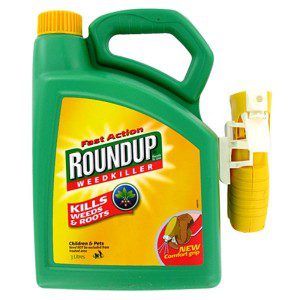By Sayer Ji
Contributing Writer for Wake Up World
Research published in the journal Archives of Toxicology indicates that Roundup, the most common formulation of the herbicide glyphosate, is not only more toxic than its constituent ingredients, but is capable of damaging DNA within a human cell line when diluted down to 450-fold lower concentrations than presently used in GMO agricultural applications. In the researchers’ own words, Roundup has “genotoxic effects after short exposure to concentrations that correspond to a 450-fold dilution of spraying used in agriculture.”
The chemical – glyphosate – is the highest selling herbicide in the world and has been identified as having a wide range of potential adverse health effects — largely minimized and/or under-reported — which include over two dozen diseases. Glyphosate’s primary properties of concern are its carcinogenicity, genotoxicity and endocrine disruptive actions. Roundup contains a surfactant known as polyoxyethyleneamine which functions to reduce the surface tension between Roundup and the cells exposed to it, making the cellular membranes more permeable to absorbing glyphosate and other chemicals within the formula. The surfactant in Roundup may therefore be responsible for increasing the toxicity of glyphosate by several orders of magnitude higher than it exhibits by itself.
This new research sheds light on a fundamental problem associated with toxicological risk assessments of agrichemicals (and novel manmade chemicals in general), namely, these assessments do not take into account the reality of synergistic toxicologies, i.e. the amplification of harm associated with multiple chemical exposures occurring simultaneously. Moreover, toxicological risk assessments on novel chemicals are based on the concept of determining “an acceptable level of harm,” instead of protecting those who would be exposed to a chemical by implementing the precautionary principle, i.e. if there is reason to believe that a chemical could cause harm (determined by animal and in vitro studies) then they should be regulated as if they do cause harm to humans. The precautionary principle would require that the manufacturers of these chemicals prove their product is safe to humans before being allowed to release it onto the market or into the environment, rather than putting the burden of proving it unsafe on the consumer and/or exposed populations, as is presently the case.
Glyphosate exposure is now ubiquitous due to the fact that 88,000 tons of it were used in US in 2007 alone, and likely billions of additional pounds globally. Accumulating evidence indicates it is resistant to biodegradation and now contaminates the air, rain and groundwater throughout the areas where it has been applied.
Read More
Roundup Weedkiller: Is This Monsanto’s New ‘Agent Orange’?
Is Monsanto’s Herbicide Harming Male Fertility?
Toxicology Research on Roundup
About the Author
Sayer Ji is the founder and chair of GreenMedInfo.com. His writings and research has been published in the Wellbeing Journal, the Journal of Gluten Sensitivity, and have been featured on Reuters, Mercola.com, NaturalNews.com, Infowars.com, GaryNull.com, Care2.com. His critically acclaimed essay series The Dark Side of Wheat opens up a new perspective on the universal, human-species specific toxicity of wheat, and is now available for PDF download. Follow Sayer on Facebook or on Twitter

If you've ever found value in our articles, we'd greatly appreciate your support by purchasing Mindful Meditation Techniques for Kids - A Practical Guide for Adults to Empower Kids with the Gift of Inner Peace and Resilience for Life.
In the spirit of mindfulness, we encourage you to choose the paperback version. Delve into its pages away from screen glare and notifications, allowing yourself to fully immerse in the transformative practices within. The physical book enriches the learning process and serves as a tangible commitment to mindfulness, easily shared among family and friends.
Over the past few years, Wake Up World has faced significant online censorship, impacting our financial ability to stay online. Instead of soliciting donations, we're exploring win-win solutions with our readers to remain financially viable. Moving into book publishing, we hope to secure ongoing funds to continue our mission. With over 8,500 articles published in the past 13 years, we are committed to keeping our content free and accessible to everyone, without resorting to a paywall.







